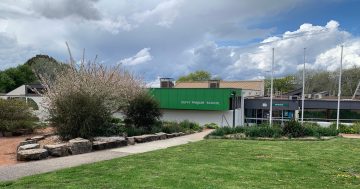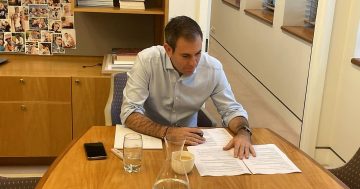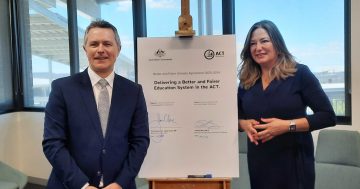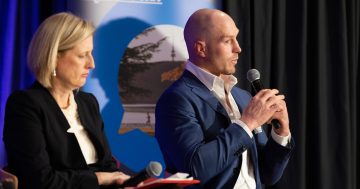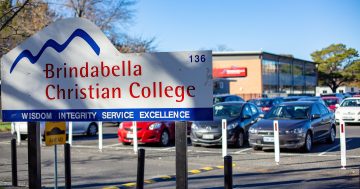The first response to our Email Interviews has been returned from no less than one of Canberra’s current Senators – Liberal Senator Gary Humphries.

Kudos goes to him for being the first to take the time and to have the bravery (you Rioters can be vicious after all) to reply.
Senator Humphries responses, in full and unedited, can be found below:
Question one: Provide a short (no greater than 200 word) employment application style Resume (CV), including what work have you done apart from being a politician or political staffer or party/union/lobby employee and what experience or qualifications you have with regards to economic management?
* 1978 – 1983: Bachelor of Laws, Australian National University. Highlights included: growing a rather fetching moustache, being President of the ANU Student’s Association (1982); editing Woroni; occasional attendance of lectures.
* 1984 – 1987: Barrister and solicitor in Canberra and Yass.
* 1989 – 2000: Elected to the first ACT Legislative Assembly. Filled various ministerial and shadow ministerial roles, including: Education, Environment, Health, Police and Emergency Services, Planning, Attorney-General and Treasurer. Highlights included: putting in place Australia’s first carbon emissions reductions targets in the ACT; handing down the ACT’s first ever surplus budget; establishing the SouthCare rescue helicopter service.
* 2000 – 2002: Chief Minister of the ACT/ Leader of the Opposition. Highlights included: overseeing the largest investment in the Territory’s roads and infrastructure since self-government; introducing free bus travel for school children; signing a symbolic lease transferring ownership of Namdgi National Park to its traditional owners, the Ngunnawal people; consolidating Canberra’s sister city relationship with Beijing.
* 2003- present: Senator for the ACT. Highlights include: saving the York Park trees; bringing ABC radio reception to the Tuggeranong Valley; protecting jobs at the National Film and Sound Archive; crossing the floor on the ACT’s Civil Unions legislation; standing up for Canberra within the Federal Parliament.
Question two: What would you like to see as the first piece of legislative change brought about by your Government? What are your personal goals for your first year representing the ACT?
The first piece of legislation I would like to see changed is that regarding the indexation of Commonwealth Superannuation pensions. I stated in my maiden speech that I was committed to addressing the declining position of Commonwealth superannuants in relation to other retirees, and this was not an empty promise.
I am determined to work for reform in the way increases to Commonwealth superannuation pensions is calculated. Clearly, increases based on CPI are inadequate. Between 1990 and 2000 CPI rose by 24 per cent. However, average weekly earnings increased by 47 per cent. Furthermore there are increasing doubts among economists over the way inflation is measured and its reliability as a cost of living indicator.
Contrary to much public perception, the overwhelming majority of public sector superannuants do not receive large pensions. In fact, 65 per cent receive less than $20,000 per annum and 22 per cent receive less than $10,000 per annum. Many rely on social security as a top up to make ends meet.
The Senate Select Committee on Superannuation documented the unfairness in maintaining a nexus between CPI and increases in Commonwealth superannuation pensions. This report, and that of another Senate Select Committee, has recommended tying these pensions to average weekly earnings.
I regret that, to date, successive Commonwealth governments have seen not fit to rectify the manifest inadequacy of the present arrangements. The present government has cited the cost of doing so, and indeed it is fair to say that the cost would be significant. However, I remain hopeful that this position can be changed. I certainly have set myself the goal of persuading the Federal Government to adjust Commonwealth superannuation pensions more generously. My lobbying to this end has been both private and public, and I would continue with this if elected for another three years. This is not a very ‘sexy’ issue, but it is one which affects many thousands of people throughout the ACT, and I am committed to getting a better deal for them.
Question three: What private opinions do you hold which are different to those of your party? On which issues do you disagree with your Party’s stated position?
The above issue of superannuation indexation is one important area where my personal and public views differ markedly from the party’s policy. I have also differed quite publicly from the party over the issue of civil unions, when I crossed the floor on two occasions to protect the ACT’s legislation on this. There have also been a number of smaller issues over which I have disagreed with the party’s policy or proposed course of action, for example the proposal to remove the York Park trees in the Parliamentary Triangle, and the plan to centralise the National Film and Sound Archive’s operations in Sydney, causing job losses in Canberra. I am proud to say that on both these occasions, my public disagreement with the party resulted in positive outcomes for Canberra – the York Park trees still stand today, and the NFSA remains a thriving Canberra institution
Question four: Are you in favour of fixed election terms? Why or why not and if so what length of term are you in favour of and why?
I am open to the idea of having a referendum on fixed terms, but I don’t know that it is really a key issue for most people. Generally in an election year I think people are more concerned about sizing up the two parties and assessing their policies, ideas, and personalities than they are about the actual election date. There is a tendency among people involved in politics to assume that the things they are obsessed with are also obsessing the general population, and this debate about fixed terms is an example of that, I think. That said, I am not opposed to such a change if the majority of Australians voted for it.
Question five: Do you think that it is important for the Prime Minister and their family to live in Canberra? Why or why not?
I believe that the Prime Minister of the day should live in Canberra, and I am on the record as expressing disappointment about the current PM’s decision not to do so. Although I understand the need for the Prime Minister to also represent their constituents, I think it is very important that the Prime Minister be based in Canberra, where the important work of Government is done.
Question six: Do you consider that making observations about the structure and makeup of the other major political party as beneficial to your own party’s role in the election?
I think it is important to ensure that those parties asking for the opportunity to lead this country be subjected to pretty rigorous scrutiny, and that includes examining their strengths, weaknesses and possible flaws. I don’t think this necessarily has to be negative, but I do think it is important to examine potential governments very closely to ensure they are actually capable of running Australia. This is not so much for the benefit of our party’s fortunes, but more to ensure that people think very carefully about who the opposition is and what they stand for.
Question seven: What are you thoughts on the permanent trading of water entitlements, as per The National Water Initiative (http://www.dpmc.gov.au/water_reform/nwi.cfm), and do you believe that giving water a tradable, economic value is really the best method to ensure that this scare Australian resource will be utilised sensibly in the future?
I believe that with Australia’s ever more serious water shortage, we need to start thinking about water and its use very differently from how we have in the past. That includes more regulation to ensure that everyone who needs access receives an appropriate share, as well as some limitation of use to ensure our supplies remain at a sustainable level.
I believe giving water a set value does encourage more sensible and sustainable use because this drives home to people the need to economise – when wasting water means paying more, people will be very unlikely to waste a single drop.
Question eight: Canberra has a large student population and Govt funding per capita for public education facilities seems to be on the slide with there being an apparent shift towards encouraging more people to enter the private education sector. What are your thoughts on this? What initiatives would you pursue in regard to HECS fees, full fee paying uni courses, increasing/decreasing Austudy payments, funding for education/ R&D/communications infrastructure and assistance or encouragement to private sector research and technology companies? What measures will you take to ensure the best possible education is available to all Australians?
I have to disagree with the assertion that Higher Education funding is in decline, as the figures indicate that the opposite is actually the case. In the 2007-08 Budget university funding was at nearly $8.5 billion, up from around $5 billion at the time this government first came to office in 1996. In addition to this base funding, in the 2007-08 Budget the Government announced that it would set up the $5 billion Higher Education Endowment Fund – investing some of the nation’s surplus in a fund which would provide an on-going revenue stream for universities to draw on. This money will be accessed through a grants program, and can be used for research and development or to fund major capital works and resource upgrades. The Higher Education Endowment Fund will give universities on-going access to extra funds over and above their usual funding, and this will help support their work across a range of areas. I emphatically reject the idea that this Government’s policies have been aimed at driving people into private tertiary institutions, and I think the figures show our support for the higher education sector as been strong and on-going.
Your question also asked about measures to ease the financial burden of education on students. The Government has committed $400 million over the five years to 2009 to provide 43,000 Commonwealth Learning Scholarships to students from low socio-economic backgrounds. This year, the Government also funded an additional 29,000 new Commonwealth Supported undergraduate places at Australian universities. Far from becoming less accessible for people, approximately 97% of all domestic undergrad students are currently in Commonwealth Supported places.
I understand that there are some who would like to see all university fees and charges dropped, and a return to the system of free education in place throughout the 1970’s. This is simply not possible for one key reason: whereas in the early 1970s less than 10% of the Australian population went to university, now more than 30% of school leavers do and many thousands more sign up as mature age students- all up about 984,000 students each year. The cost of subsidising all these people is simply too great for any government to bear, which is why the current system of giving students interest free loans to pay for their degrees is necessary. The Commonwealth Learning Scholarships program ensures that those who cannot afford to pay even the most minimal costs still have access to tertiary education, and the FEE-HELP system lets all other students learn without hitting them with high upfront costs for this.
Question nine: What’s the single most pressing issue in your electorate (local electorate issue – not a broader issue that has an impact on your electorate) and how do you plan on addressing it?
I don’t think there is just one pressing local issue here in Canberra, but water security would have to be near the top of the priority list. As an inland city with limited access to natural water supplies Canberra faces some real challenges when it comes to securing our water resources into the future. The ACT Government has taken a step in the right direction this week but their plan has a number of flaws.
In particular, it addresses the issue of supply, but not the problem of demand. All of us could make significant reductions in the amount of water we use, and this would make our limited resources go a lot further, yet there is nothing in the ACT Government’s plan to encourage this. I am a strong supporter of initiatives like the Federal Government’s Community Water Grants program which give sporting clubs, school and community groups money for rainwater harvesting, tap and toilet upgrades and grey water pumping systems. Sixty-three organisations received grants ranging from $3,000 to $45,000 in the latest round, and I think this is a great way of helping people cut down on the amount of water they use. Also, the Queanbeyan Council has a great WaterWise program which assists people with the cost of implementing water saving measures in their homes, and I would have liked to see the ACT Government go down this path as part of their big water strategy.
While the Federal Government is doing its bit at the local level, there is also one thing I have been pushing for on the larger scale: the transfer of Googong Dam to ACT ownership. The fact that the ACT does not own its own water resources is an unusual hangover from the days before self-government, and I have long campaigned to have this rectified. I am very pleased to say that the Federal Government has heard this call and I was able to this week announce that the Commonwealth will transfer ownership of Googong Dam to the ACT. As part of this, a set allocation will be made for Queanbeyan – a great move which secures the ACT’s water supply and guarantees access for Quenabeyan into the future in a single stroke. I am really proud to be able to add this to the list of things I have achieved for the people of this region.
Question ten: Suppose that you and I are stuck in an elevator for 5 minutes. You know nothing about me other than I’m enrolled to vote in your electorate. What do you say to convince me to vote for you.
If I were stuck in a lift, I would probably be more concerned with getting out of there than talking policy. So I would try to use my shoe-laces and wristwatch to organise a MacGyver-style escape and hope that this impressed the prospective voter enough to vote for me! Failing that, I would ask what issues are important to them, their friends, family and the wider community, and how I can help to address these.













